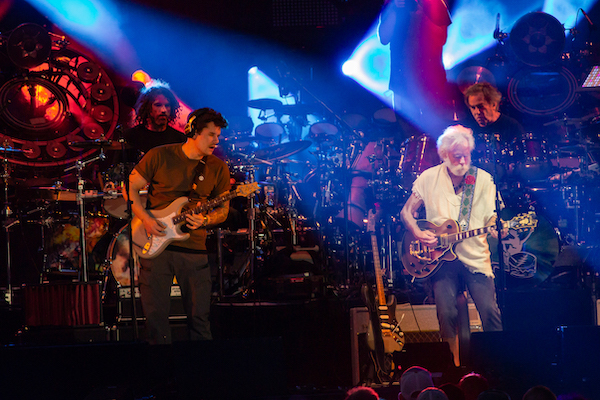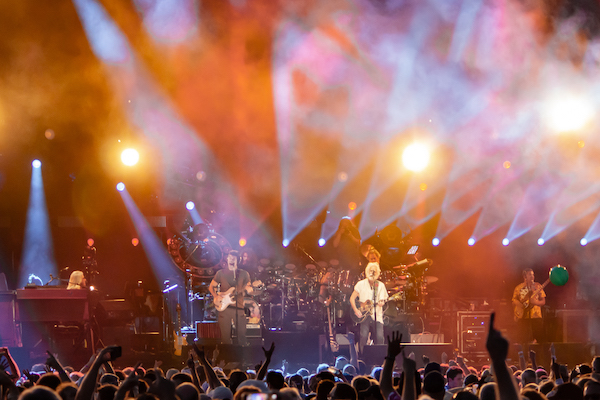Concert Review: Dead & Company’s “Final Tour” at Fenway — A Pertinent Farewell on Sunday
By Paul Robicheau
Perhaps more impressive — though too late to evolve further given the group’s impending finale after eight years and more than 200 shows — was the growing roles and comfort level shown by Dead & Company’s younger charter members.
Dead & Company, Sunday, June 25 at Fenway

Dead & Company on Saturday night at the Fenway. l to r: Jay Lane, John Mayer, Bob Weir, and Mickey Hart. Photo: Sam McLennan
After Saturday’s long, strange, curfew-busting trip, Dead & Company returned to Fenway Park on Sunday for what was apparently its last-ever Boston appearance, delivering a show that was shorter yet solid, recurringly bluesy and — at times in the second set — both endearingly jammy and frustratingly meandering.
The band seemed to be in rough shape as its “Final Tour” kicked in this summer, given drummer Bill Kreutzmann’s decision to bow out and some nights where Bob Weir — the group’s central survivor now sporting the white hair and beard — both looked and sounded ragged while continuing to slow down the tempos.
Yet, while Weir looked worn and furrowed in the face at age 75, his voice sounded sure and sturdy on Sunday. Remaining Grateful Dead percussionist Mickey Hart, 79, likewise rose into some vigorous playing on and around the beat in tandem with Jay Lane, who laid down a thumping anchor in Kreutzmann’s absence.
Yet perhaps more impressive — though too late to evolve further given the group’s impending finale after eight years and more than 200 shows — was the growing roles and comfort level shown by Dead & Company’s younger charter members.
This was readily apparent in Sunday’s short-but-sweet first set, which clocked in at less than 70 minutes. After warming up second-night attendees with “Samson and Delilah” and “Cold, Rain & Snow” (though a thunderstorm forecast dissipated to leave a fairly clear, comfortable night in the packed ballpark), the band settled in with a gentle, escalating “Jack Straw,” John Mayer deftly trading verses with Weir. Then the younger lead guitarist took charge of “Althea,” boosting the energy level with a ripping climax of high sustains, plus a few power trills for good measure.
Deadheads once hoisted signs to “Let Phil Sing” in a nod to then-taciturn bassist Phil Lesh (who split the surviving Dead gang after 2015’s “Fare Thee Well” gigs in Chicago and San Francisco). It’s odd that signs to “Let Oteil Sing” haven’t become popular. Six-string bass virtuoso Oteil Burbridge, who earned his stripes with the Allman Brothers Band, is technically also one of Dead & Company’s best singers. He got two showcases on Sunday. He dusted off the Robert Hunter/Jerry Garcia ballad “Comes a Time” (with graceful piano from Jeff Chimenti and another bluesy solo by Mayer) in the first set. Then he distinguished the second-set centerpiece “Fire on the Mountain” with both his vocal and oozing, serpentine bass, while Mayer played through an auto-wah effect that evoked Garcia’s old envelope-filter sound.
The compact first set found surprising life and a bit of a jam in a well-placed “He’s Gone,” bookended by the nugget “Mr. Charlie” (Weir and Mayer volleying its roly-poly lyrics) and a “Goin’ Down the Road Feeling Bad” that let everyone dig into the vocals to cap an opening frame both relaxed and spirited.
The second set began in similar fashion with an upbeat, 1973-style take on “They Love Each Other,” Mayer leading on vocals and a choppy, cooking groove in which drums and guitars were locked in, before arcing spotlights mirrored the guitars to drop into “Playing in the Band.” Weir effectively phrased near-spoken word with the melody in the verses, and soon the sextet wandered into jazzier improvisation with a beautiful flow, despite an up-and-down sense of direction.

Dead & Company on Saturday night at the Fenway. Photo: Sam McLennan
At least the group was growing more abstract, with Mayer’s guitar chiming against the flow, a trend that continued in a pairing of “Help on the Way/Slipknot!” that grew tighter as he laced slippery guitar lines, Burbridge covered mid-range space with spidery bass, and the drummers traded fills to a conclusion that would usually segue into “Franklin’s Tower” (whose “Roll away the dew” chorus may not have fit the moment). “Fire on the Mountain” emerged instead, with video screens showing members playing amid rising clouds of flame, before Burbridge (rather than Lane) joined Hart for a pummeling of rear-stage drums. Hart moved to the blaster beam alone, offsetting the bowed drone of that stringed instrument with pulses from rubbing his white-gloved fingers across electronic pads like a mad scientist in a sound lab.
The move from “Drums” to “Space” brought Mayer, Weir, and Burbridge back to the stage for gamelan-styled sonics, then a floaty jam where Chimenti iced what seemed like a tease toward the return of “Playing in the Band.” But that melodic fragment cycled on and on for several minutes with minimal variation before the group finally soared into the song’s brief reprise. The real surprise arrived in a fierce subsequent buildup into “The Other One,” a nine-minute return to that warhorse from Saturday that eventually let Weir roar into its second verse.
A changeup to the ballad “Standing on the Moon” was a letdown in momentum after the jolt of “The Other One,” but Weir pulled it off with a hearty, heartfelt vocal. The triumphant chorus “I’d rather be with you” cast a double meaning for those already missing departed composer Garcia and — for old Heads and newbies alike — those about to miss Dead & Company as well. That same vibe carried through generally rote set-closer “Not Fade Away,” its refrain of “You know our love won’t fade away” given added pertinence to the moment as the fans chanted and clapped along.
A rare double encore (given the comparatively short show spanning just over three hours of music, well ahead of curfew) added sentiment rather than steam. The Band standard “The Weight” has been overdone, though Dead & Company gave it a particularly full-fledged treatment with verses traded all around. Still, “Ripple” holds nostalgic appeal, and one could do worse than the last words sung in Boston by the Dead-aligned mothership being “If I knew the way, I would take you home.”
Paul Robicheau served more than 20 years as contributing editor for music at the Improper Bostonian in addition to writing and photography for the Boston Globe, Rolling Stone, and many other publications. He was also the founding arts editor of Boston Metro.

Outstanding review, Paul. Wish I could have made it to one of these last shows.
Loved the review Paul. Great work as usual !
Agree with Rick McHale. Your outstanding review took me for a great ride!